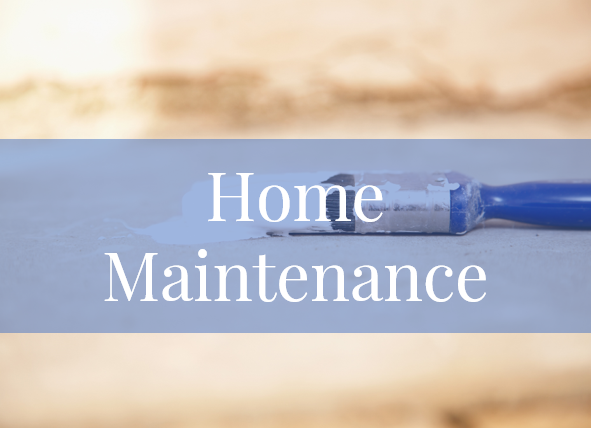Your Summer Home Maintenance Guide
/Summer is a season of sunshine, warmth, and outdoor activities, but it's also an ideal time to focus on maintaining your home. By tackling essential maintenance tasks during the summer months, you can ensure your home remains safe, efficient, and comfortable throughout the year. Whether you're a new homeowner or have owned your property for years, this extended guide will provide you with detailed instructions and tips to keep your home in top shape.
Why Regular Home Maintenance is Important
Regular home maintenance is crucial for several reasons. First and foremost, it helps to preserve the structural integrity of your home. Small issues, if left unattended, can escalate into costly repairs.
For example, a minor roof leak can lead to extensive water damage and mold growth if not fixed promptly. By conducting regular inspections and addressing maintenance tasks as they arise, you can catch problems early and prevent them from becoming major headaches.
Secondly, regular maintenance enhances the efficiency of your home's systems and appliances. HVAC systems, for instance, consume more energy when filters are clogged or components are not properly maintained. By cleaning filters, scheduling professional tune-ups, and upgrading to energy-efficient appliances, you can lower your utility bills and reduce your carbon footprint.
Moreover, maintaining your home improves its curb appeal and resale value. Potential buyers are more likely to be attracted to a well-maintained property that requires fewer immediate repairs. This can translate into a quicker sale and potentially a higher selling price.
Lastly, regular maintenance contributes to the health and safety of your family. Issues such as faulty wiring, gas leaks, or poorly maintained smoke detectors can pose significant hazards. By staying on top of maintenance tasks, you can ensure that your home remains a safe haven for you and your loved ones.
Budgeting for Home Maintenance
Setting aside money for home maintenance is a prudent financial practice. Experts recommend budgeting approximately 1% to 3% of your home's purchase price annually for maintenance and repairs. For example, if your home is valued at $300,000, you should aim to budget between $3,000 and $9,000 per year for maintenance.
This budget should cover routine tasks such as HVAC inspections, roof repairs, and landscaping, as well as unexpected repairs that may arise. It's wise to establish an emergency fund specifically earmarked for home repairs to handle unexpected expenses without disrupting your overall budget.
By allocating funds for regular maintenance and unexpected repairs, you can protect your investment and ensure that your home remains in optimal condition for years to come. Think of it as proactive care for your most valuable asset — your home.
In the following sections, we'll delve into specific summer maintenance tasks that will help you keep your home in excellent shape and maximize its longevity and value. From inspecting and maintaining your roof to preparing for extreme weather, each task plays a vital role in the overall maintenance of your property. Let's explore these tasks in detail to ensure your home is well-prepared for the summer and beyond.
Inspecting and Maintaining Your Roof
Your roof is your home's first line of defence against the elements. During the summer, it's crucial to inspect your roof for any signs of wear and damage:
Check for Damage: Look for cracked, curled, or missing shingles. Pay attention to areas where the roof meets vents, chimneys, and skylights, as these are common spots for leaks.
Clean Gutters and Downspouts: Clear debris such as leaves, twigs, and dirt from gutters and downspouts. Clogged gutters can lead to water backing up under the roofline, causing damage to both the roof and siding.
Inspect Roof Flashing: Check the flashing around roof penetrations (like chimneys and vents) for rust or gaps. Replace or repair as necessary to prevent water intrusion.
Exterior Maintenance
Your home's exterior requires regular upkeep to protect against weather damage and maintain its curb appeal:
Inspect and Repair Siding: Look for cracks, holes, or warping in siding panels. Repair damaged areas promptly to prevent moisture from seeping into your home's structure.
Pressure Wash Exterior Surfaces: Remove dirt, mold, and mildew from siding, decks, and driveways using a pressure washer. This helps maintain the appearance of your home and prolongs the life of exterior materials.
Seal Cracks and Gaps: Inspect caulking around windows, doors, and trim. Replace any cracked or deteriorated caulking to improve energy efficiency and prevent water intrusion.
Landscaping and Outdoor Areas
A well-maintained landscape enhances your home's curb appeal and enjoyment:
Lawn Care: Adjust your lawnmower blade to the appropriate height for your grass type. Mow regularly to keep grass healthy and discourage weed growth.
Watering Practices: Water your lawn deeply but infrequently to encourage deep root growth. Early morning is the best time to water to minimize evaporation.
Prune Trees and Shrubs: Trim overgrown branches away from the house and power lines. Pruning promotes healthy growth and reduces the risk of damage during storms.
HVAC System Maintenance
Your HVAC system works hard during the summer to keep your home cool. Regular maintenance ensures optimal performance and energy efficiency:
Schedule Professional Maintenance: Hire a qualified HVAC technician to inspect and service your air conditioning unit. They will clean coils, check refrigerant levels, and ensure all components are working efficiently.
Replace Air Filters: Dirty air filters restrict airflow, making your HVAC system work harder and consuming more energy. Replace filters every 1-3 months, or as recommended by the manufacturer.
Programmable Thermostat: Consider installing a programmable or smart thermostat to regulate indoor temperatures efficiently, saving energy and money.
Plumbing and Water Systems
Summer is a good time to inspect and maintain your home's plumbing to prevent leaks and water damage:
Check for Leaks: Inspect faucets, toilets, and under-sink plumbing for leaks. Addressing leaks promptly can prevent water damage and mold growth.
Test Sump Pump: If you have a basement or crawl space, test your sump pump by pouring water into the sump pit. Ensure it activates and pumps water away from your home's foundation.
Inspect Outdoor Irrigation Systems: Check sprinkler heads for proper alignment and function. Adjust settings to avoid watering sidewalks or driveways, and ensure plants receive adequate water.
Pool Maintenance (if applicable)
If you have a pool, proper maintenance ensures it remains clean, safe, and enjoyable throughout the summer:
Clean Pool Surface: Skim leaves, insects, and debris from the water surface daily. Use a pool vacuum to clean the bottom and sides of the pool weekly.
Monitor Chemical Levels: Test pool water regularly and adjust chlorine, pH, and alkalinity levels as needed. Proper water chemistry prevents algae growth and maintains water clarity.
Inspect Pool Equipment: Check pump and filter baskets for debris and clean or replace them as necessary. Lubricate O-rings and inspect hoses and connections for leaks.
Safety and Security Checks
Protect your home and family by ensuring your property is secure and equipped with functioning safety devices:
Test Smoke and Carbon Monoxide Detectors: Press the test button on smoke and CO detectors to ensure they are operational. Replace batteries annually and detectors every 7–10 years.
Review Home Security Measures: Inspect locks, deadbolts, and door and window frames for signs of wear or damage. Consider upgrading to smart locks or installing motion-sensing outdoor lights for added security.
Create an Emergency Plan: Develop a family emergency plan that includes evacuation routes, designated meeting spots, and emergency contacts. Review and practice the plan regularly.
Energy Efficiency Upgrades
Improving your home's energy efficiency not only reduces utility bills but also enhances comfort:
Upgrade Insulation: Check attic insulation levels and add more if needed. Proper insulation keeps your home cooler in the summer and warmer in the winter, reducing heating and cooling costs.
Install Energy-Efficient Windows: Replace old windows with energy-efficient models that have low-E coatings and double or triple panes. These windows reduce heat transfer and block UV rays, protecting furnishings from fading.
Use Ceiling Fans: Set ceiling fans to rotate counterclockwise in summer to create a breeze that helps cool the room. This allows you to raise the thermostat setting without sacrificing comfort. For more information on the benefits of ceiling fans, read our full blog post on the subject: Ceiling Fans: Why You Should Consider One or More for Your Home
Cleaning and Maintenance Tasks
A clean home is a healthy home. Summer is a great time to tackle deep cleaning and maintenance tasks:
Clean and Declutter: Declutter closets, cabinets, and storage areas. Donate items you no longer need and organize remaining belongings for easier access.
Deep Clean Carpets and Upholstery: Hire a professional carpet cleaner or rent a steam cleaner to remove dirt, dust, and allergens from carpets and upholstery.
Service Appliances: Clean refrigerator coils to improve energy efficiency. Check oven seals for wear and clean stove burners and vents to ensure optimal performance.
Preparing for Extreme Weather
Summer storms can bring high winds, heavy rains, and power outages. Be prepared to protect your home and family:
Secure Outdoor Items: Anchor or store outdoor furniture, grills, and decor during storms to prevent damage or injury from flying objects.
Trim Trees and Branches: Trim overhanging branches that could break during a storm and damage your home or power lines.
Stock Emergency Supplies: Keep a stocked emergency kit with essentials such as water, non-perishable food, flashlights, batteries, first aid supplies, and medications.
In summary…
By following this comprehensive summer home maintenance guide, you can ensure that your home remains in top condition, comfortable, and energy-efficient throughout the season and beyond. Regular upkeep not only enhances the aesthetic appeal of your property but also protects your investment in the long term. Take advantage of the summer months to address these tasks and enjoy the peace of mind that comes with a well-maintained home.
Remember, each home is unique, so tailor these maintenance tips to fit your specific needs and priorities. Whether you tackle these tasks yourself or enlist the help of professionals, staying proactive about home maintenance will pay off in the form of a safer, more comfortable living environment for you and your family.


















